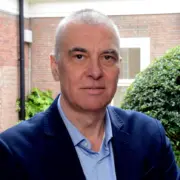Wij kunnen hier in Europa wel internationale samenwerking en dialoog prediken, wie ziet wat er in China en Rusland gebeurt slaat de schrik om het hart. Ongehinderd door democratische oppositie ontwikkelen die landen in hoog tempo uiterst geavanceerd wapentuig. Michèle de Waard sprak erover voor het Financieele Dagblad met o.a. strategisch analist Patrick Bolder.
Is het Westen opgewassen tegen deze autoritaire rivalen, die het gevaarlijkste wapentuig en nieuwe vormen van oorlogvoering in snel tempo ontwikkelen, ongehinderd door een democratische oppositie?
Het thema ontwapening is definitief van de agenda. Amerika en Rusland hebben de afgelopen decennia elk hun kernwapenarsenaal weliswaar teruggebracht van 12.000 lange-afstandsraketten naar 1550 kernkoppen in 2019, maar het regime om het kernwapenarsenaal van de grote machten verder te verminderen ligt onder vuur.
‘Sterker, de nieuwste Russische militaire doctrines gaan ervan uit dat kernwapens bij een conflict kunnen worden ingezet tegen een grote conventionele macht, omdat het Westen conventioneel – tanks, vliegtuigen, schepen – sterker is’, zegt Patrick Bolder, luitenant-kolonel bij de Koninklijke Luchtmacht en strategisch analist bij het Den Haag Centrum voor Strategische Studies (HCSS).
Zo heeft Rusland in strijd met afspraken met de VS de nieuwste typen kernraketten opgesteld, de SSC-8, met een bereik van 500 tot 5500 kilometer. Daarmee kan iedere Europese stad worden getroffen. Tegelijkertijd is Rusland bezig hypersone raketten te ontwikkelen. Ze vliegen laag en sneller dan het geluid en zijn moeilijk traceerbaar, omdat ze onder de radar blijven. Vorige maand kwamen de Navo-ministers van defensie bij elkaar omdat ze zich zorgen maken over het uitgebreide en groeiende arsenaal aan Russische kernraketten. ‘Destabiliserend en gevaarlijk’, noemde Stoltenberg Rusland, ook vanwege de nucleaire retoriek uit Moskou tegen de buurlanden.
Nieuwe dreigingen vragen om nieuwe antwoorden. Niet voor niets wees Navo-chef Stoltenberg er onlangs bij de presentatie van de nieuwe Navo-strategie Navo 2030 op dat behalve militaire kracht ook politieke en economische middelen moeten worden ingezet. Cruciaal is volgens Stoltenberg dat Amerika en Europa verenigd moeten zien te blijven gezien de nieuwe dreigingen uit China en Rusland. Een hele kunst in een tijdsgewricht waarin niet alleen de Amerikaanse president, maar ook nationalistische en extreemrechtse groepen proberen de Europese Unie en de Navo te ondermijnen.
‘Zijn we wel bestand tegen de informatie-oorlog van het Russische trollenbureau, tegen politieke hacks die onze verkiezingen in het Westen beïnvloeden, tegen economische oorlogvoering?’, vraagt Bolder van het Haagse veiligheidsinstituut zich af. De druk op Europese politici zal stijgen om zich bij een van de kampen aan te sluiten. Het Britse besluit op aandringen van Washington om het Chinese Huawei bij de opbouw van zijn 5G-mobiele netwerk uit te sluiten wijst daarop.
Bolder is ervan overtuigd dat nieuwe dreigingen het Westen – Europa én Amerika – zullen dwingen gezamenlijke politieke standpunten te formuleren. Zo heeft Nederland recent weliswaar een China-strategie ontvouwd. Maar, vraagt Bolder zich af, is het niet belangrijker dat Europese en westerse landen gezamenlijk een positie ten aanzien van China innemen?
Lees het hele artikel van Michèle de Waard in het Financieele Dagblad van 1 augustus 2020.

